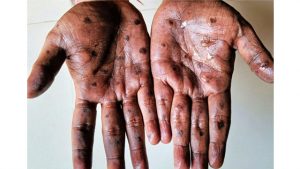 In response to the ongoing global health concerns surrounding monkeypox, now commonly referred to as Mpox, the Government of Guyana has intensified its preventive measures at the nation’s borders.
In response to the ongoing global health concerns surrounding monkeypox, now commonly referred to as Mpox, the Government of Guyana has intensified its preventive measures at the nation’s borders.
Health Minister Dr Frank Anthony announced on Saturday that port health staff across the country have been instructed to be vigilant for individuals showing symptoms of Mpox, such as the characteristic skin rash associated with the virus.
The announcement underscores the country’s proactive stance in safeguarding public health, even as vaccines are being stockpiled to protect vulnerable populations.
Anthony revealed that port health officers have undergone specialized training to identify potential cases of Mpox among incoming passengers. These officers are now conducting visual inspections at all entry points, looking for signs of the viral infection.
The Health Minister emphasized that the World Health Organisation (WHO) does not recommend border closures as a measure to control the spread of the virus. Instead, the focus remains on early detection and isolation to prevent further transmission.
In addition to the increased border surveillance, Anthony noted that medical professionals in Guyana are being mobilized to respond swiftly to any potential outbreak. A refresher course for doctors began this weekend, ensuring that healthcare providers are up to date on the latest protocols for identifying and managing Mpox cases.
This preparedness is critical, as infected individuals would require isolation at the Infectious Disease Hospital in Liliendaal, Greater Georgetown, for a period ranging from two to four weeks.
As part of the national preparedness plan, the Ministry of Health has already stockpiled mpox vaccines. These vaccines will be administered to specific segments of the population deemed most vulnerable to the virus. A National Response Committee has been established to guide the strategic distribution of the vaccines, ensuring that those at greatest risk are prioritized.
Laboratory testing capabilities have also been bolstered, with Anthony confirming that test results will be available within hours of specimen collection. This rapid testing is expected to play a crucial role in containing any potential outbreak by enabling quick identification and isolation of infected individuals.
Mpox is a viral zoonotic infection caused by the monkeypox virus, which is closely related to the virus that causes smallpox. The infection typically presents with a rash similar to that of smallpox, along with other symptoms such as fever, headache, and muscle aches. The virus can be transmitted through direct or indirect contact with an infected person, animal, or contaminated objects.
Transmission methods include respiratory secretions, percutaneous inoculation, and even vertical transmission from mother to child.
The incubation period for Mpox generally ranges from five to 13 days but can vary from 4 to 21 days. During the 2022 outbreak, the incubation period was observed to be between 7 to 10 days following exposure.
